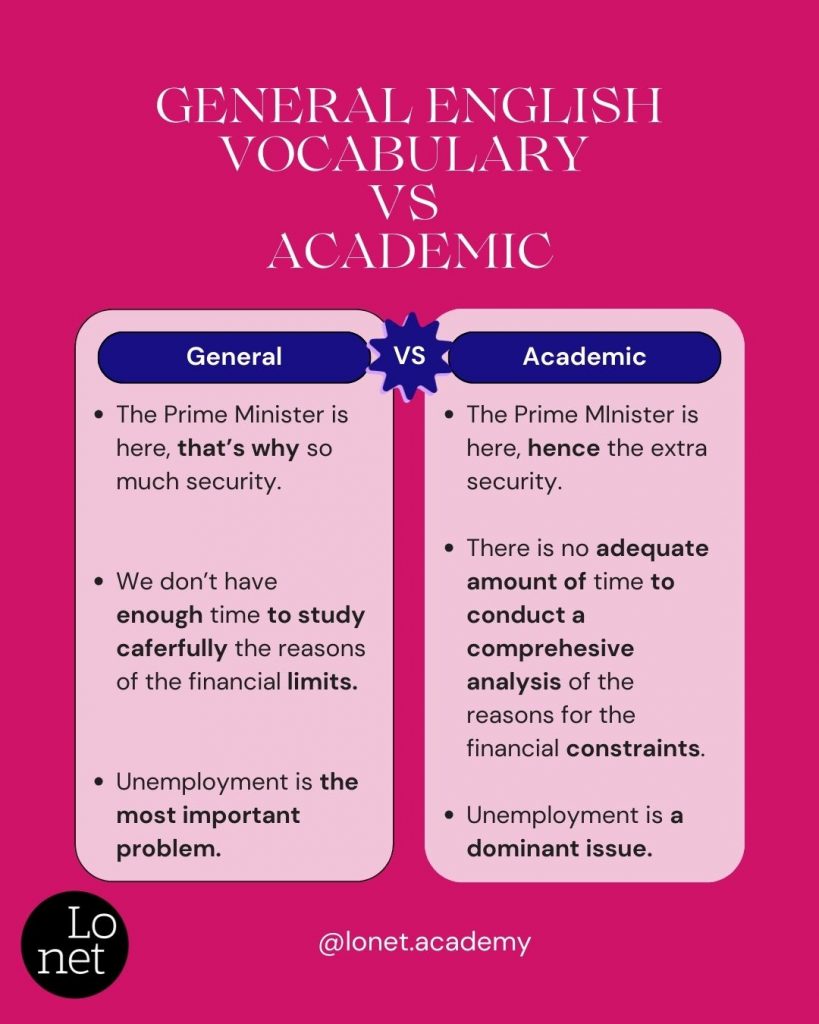
What you need to know for IELTS preparation: FAQs answered
The IELTS stands for The International English Language Testing System. It is one of the most important international tests assessing your English language proficiency. It is a required assessment for those students planning to study in higher education institutions worldwide in the English language. Also, it is a must-have test for those applying for studies in English-speaking countries or looking for job opportunities in international companies worldwide. IELTS assessment can also be required for visa/immigration authorities in English-speaking countries. Your success on the IELTS exam is based on more than just practicing your English skills. The IELTS preparation needs a structured approach and there are several important aspects to know before you start preparing for the test.
– the difference between Academic IELTS and General IELTS
– General vocabulary vs Academic vocab in the IELTS
– the difference between General and Academic IELTS reading and writing tasks
– how to stop procrastinating and start IELTS preparation
– useful links and materials for self-preparation for IELTS
– most common topics on the speaking part of the IELTS exam
– most common topics on the IELTS reading test
What’s the difference between Academic IELTS and General IELTS exam
The IELTS Academic test is aimed at those who wish to study at a university or college. Educational institutions internationally demand to see the results of the IELTS ACADEMIC assessment.
The IELTS General Training test has been developed to test your general, everyday English skills. The General assessment is mostly required for migration purposes to an English-speaking country.
Major differences in the assessment between the Academic and General IELTS tasks lie in the style of the language used, expressions, grammar structures, and vocabulary specifics.
General English can include purely conversational (idiomatic) expressions, simpler (still correct) grammatical structures, and general everyday vocabulary, describing usual activities, places, and feelings. General English is what you hear and use with people daily, with friends and family. On the other hand, Academic English uses specific vocabulary, different sentence structures, objective facts, details, critical thinking, and reasoning. The Academic World List will help you check on the vocabulary in the academic-style lexis of the language.
Here are some examples of the general English vocabulary vs academic English vocabulary:


Watch a video about important academic words for IELTS here:
General IELTS tasks vs Academic IELTS
Regarding the listening and speaking tests in the IELTS, there is no difference between general English and Academic. The topic might be slightly different, but, in general, the most important aspects that you are being assessed are your fluency in speech and your audio comprehension.
There are some differences in reading and writing IELTS tasks, though:
- For the general English IELTS reading test, you will be provided with texts on everyday topics.
While for the IELTS Academic assessment, you will be given texts on more complex topics.
For the general English IELTS reading test, you will be provided with texts on everyday topics.
While for the IELTS Academic assessment, you will be given texts on more complex topics.
resource: What’s the difference between IELTS Academic and General Training? | IELTS Speaking Test Tips
In the writing part of the IELTS exam, the General training checks your ability to write a letter about a real-life situation, while the Academic writing test will assess your ability to analyze and describe a graph with data. Another task in writing is to write an essay, expressing your point of view and arguments. In this task, the style of the essay is free and can be personal in the general IELTS, while for the academic IELTS takers, it is required to use a formal style and academic vocabulary.
How can I fight procrastination and start preparing for the IELTS?
Fear of the unknown is a common feeling among IELTS test-takers. It leads to procrastination and becomes a significant barrier to starting IELTS preparation. Usually, procrastination is connected with psychology more than with your level of language knowledge. The exam takers of all levels experience self-doubt and procrastination.
PROCRASTINATION is a result of YOUR FEAR OF UNKNOWN.
If You feel some of the below, it means you have to think about how to start your IELTS preparation (more than about your English skills):
⛔ Anxiety and paralysis – difficult to take the first step and start preparing.
😒 Lost and unsure – without a clear understanding of what to expect and where to begin.
😶 Self-doubt – negative self-talk leading to fear of failure.
🥴 Uncertainty – you don’t know what to expect, which leads to procrastination.
😨 Paralyzed by the choices and unsure where to invest your time, effort, and money.
As a result, you put your preparation aside every day, saying “I don’t know where to start…”
The only SOLUTION is: JUST DO IT.

Start Your IELTS preparation today
HOW:
1. Know the test:
Read about the exam. Find out if you need the Academic IELTS or General test. Decide if you want to pass a paper-based or computer-delivered IELTS exam. Know the grade you need. Learn the structure of the exam. Find out about the timing and directions. When you know these details, you will feel less scared and anxious.
2. Watch examples of the IELTS speaking part:
Watch videos of the speaking tests on YouTube. Seeing examples will help you understand what to expect and get to know some of the possible topics for the IELTS speaking test.
3. Analyze what makes you procrastinate:
Notice when you are putting the IELTS preparation off. Think about what feelings are stopping you from getting to it. What thoughts make it hard to start? In most cases, it is some negative self-talk, that represents your limiting beliefs. A certified language coach can help you identify those limiting beliefs and help you turn them into empowering thoughts.
4. Create a plan:
Write down your study plan. Include how you will prepare for each part of the exam.
5. Start with things you feel confident about:
Begin with exercises that seem easier to you. Read and watch things that you feel comfortable with. Focus on your strengths and build on top of your strengths, moving to more challenging parts step-by-step. You might want to hire a professional IELTS tutor at some point for checking, feedback, and assessment.
Where can I find materials to study for IELTS?
We collected 10 useful links for you if you want to prepare for the IELTS exam by yourself, without tutoring or coaching.
Helpful videos
In this video, you will find the key steps: setting your objectives, building your studying plan, and studying for each section. Many test takers get lower scores than they expected on the IELTS because of some simple mistakes that could have been avoided.
IELTS Online is an online Academic test that gives you flexibility for when and where you take your test (including at your very own home). In this video, you learn about how to register for the test, the format, and the environment to help you determine if IELTS Online is right for you.
IELTS Study Plan to prepare for the IELTS test in 2 months, in 1 month to prepare, or even just in 1 week. There is also a 2-day study plan in this video, to help you prepare for IELTS in a record time!!
In this video, the hidden traps in the IELTS Speaking test are unveiled. Through years of experience and helping thousands of students, the author has discovered that the secret to success is avoiding the subtle traps set by examiners.
On this channel https://www.youtube.com/@ieltsenglishacademy you can watch plenty of videos on the speaking test and find useful videos on preparation for IELTS.
Helpful sites
Free practice papers and resources from the official IELTS organization to help you succeed in the exam.
The IELTS Trial Test is a free familiarisation test you can take at a participating official Trial Testing location. The IELTS Trial Test is available for the Listening, Reading, and Writing sections of the test, and is offered for IELTS on paper for both IELTS Academic and IELTS General Training.
Official sample tests, writing test preparation resources, courses, apps, webinars, videos, books, and articles on the IELTS preparation from the official IELTS website.
This page provides you with various IELTS practice tests and materials for both Academic and General Training tests to help you enhance your timing and technique before taking the official test.
Understanding IELTS reading format, IELTS reading question types explained, understanding IELTS reading band score, and IELTS reading free sample tests.
What topics are there in the IELTS speaking test? IELTS speaking topics
IELTS Speaking topics Part 1: Personal Questions
In this section, the examiner will ask general questions about you and your life. The questions can be around these topics:
Work / Leisure
Food / Restaurants / Diet
Studies / College / University
Friends / Colleagues / Family
Home
Your country / Culture
Hobbies / Weekends / Holidays
Sports / Outdoors / Activities
Chores
Creativity / Art
Museums / Cinema
Pets / Animals
Habits / Routines
Driving / Traffic / Transport
Cities / Architecture
Offices
Celebrities
Travel
News / Media
Books
Technology / Digital tools
Examples of questions asked in the IELTS speaking test:
- Do you often read electronic books?
- Is it convenient to read electronic books?
- What was the last book you read about?
- Do you still read books on paper?
IELTS speaking topics Part 2 – describe a situation, a possibility, an experience, …
The topics are very similar to the first part of the test, with the difference that here you will have to describe something: a situation, a possibility, or an experience.
Some topics can be surprising, as you have never considered them. This is the trick. The examiners assess whether you can develop a conversation about something without preparation. Spontaneous speaking.
Examples:
- Talk about a fashion item that you want to buy. Include:
What it is
Where you can get it
How expensive it is
- Talk about a person in your life with a good sense of humor. Include:
Who it is
Why they are funny
How often you see them
- Talk about an animal you want to learn more about. Include:
What it is
What you know about it
Why you want to know more
IELTS Speaking Part 3 – expanded topic
The speaking part 3 on the IELTS test is an extension of the second part. So, the speaking topic is the same, but an examiner will ask you deeper questions and some may be challenging, according to your language level.
Most of the questions will be general (not personal), so be careful not to dive into your personal opinion unless you are asked.
The topics will expand to more complex and general.
For example, if your topic in Part 2 was about animals, then the expanded topic can be about endangered animals.
Examples of the questions:
- What are some of the major factors contributing to the endangerment of animals in today’s world?
- In your opinion, how important is it to raise awareness about endangered animals among the general public? Why?
- What measures do you think, governments should take to protect endangered species and their habitats?
- How can individuals contribute to the conservationism of endangered plants and animals in their daily lives?
- Do you believe that zoos and wildlife sanctuaries play a significant role in the preservation of endangered species? Why or why not?
15 Activities to Improve your IELTS Speaking Without a Speaking Partner
What topics can there be in the IELTS reading test?

English language tutors and coaches available on Lonet.
American English vs British – how is American accent different from the British one.
What is the next language to learn, after English.
How to break you language barrier.